|
|
|
Sort Order |
|
|
|
Items / Page
|
|
|
|
|
|
|
| Srl | Item |
| 1 |
ID:
147960
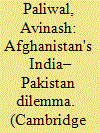

|
|
|
|
|
| Summary/Abstract |
This article seeks to examine the foreign policy behaviour of weak states in regions marked by politically turbulent geostrategic environments. An analysis of Afghanistan's foreign policy behaviour vis-à-vis Pakistan and India lends focus to this aim. India–Pakistan rivalry has gained traction as a key factor in determining Afghanistan's stability in the wake of the drawdown of Coalition forces. Missing from this debate, however, is consideration of Afghanistan's agency as a weak state with an independent set of policy preferences. Based on primary interviews with a diverse set of Afghan political actors the article outlines two competing policy advocacies: Pakistan friendly and Pakistan averse. The article argues that these advocacies are key to understanding Afghanistan's India–Pakistan dilemma. Departing from the ethnic lens used to explain Afghan politics and its regional linkages, this article shows that Kabul's relations with Islamabad determine its approach towards New Delhi regardless of ethnic rivalries. Understanding domestic Afghan narratives in this regional context is therefore imperative to adequately assess South Asia's prospective security calculus.
|
|
|
|
|
|
|
|
|
|
|
|
|
|
|
|
| 2 |
ID:
128418
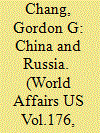

|
|
|
|
|
| Publication |
2014.
|
| Summary/Abstract |
Economic weakness has driven Vladimir Putin's Russia into a "strategic entente" with the Chinese, who in turn get a powerful global ally. The alliance could prove formidable for the West.
|
|
|
|
|
|
|
|
|
|
|
|
|
|
|
|
| 3 |
ID:
144770
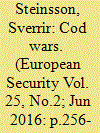

|
|
|
|
|
| Summary/Abstract |
The occurrence and outcomes of the Cod Wars defy both popular and academic expectations. Iceland, a microstate, essentially won four disputes against the UK, a great power. The two states furthermore belonged to a Western security community, sharing significant institutional, economic and cultural ties. This article reviews the history and international relations literature on the Cod Wars to explain and evaluate why the Cod Wars occurred and why Iceland won them. This article also explains what lessons international relations scholarship has learned from the Cod Wars for liberal international relations theory, realism and asymmetric bargaining.
|
|
|
|
|
|
|
|
|
|
|
|
|
|
|
|
| 4 |
ID:
097918
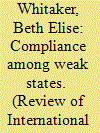

|
|
|
|
|
| Publication |
2010.
|
| Summary/Abstract |
This article examines levels of compliance with the counter-terrorism regime in Africa, where weak states might have been expected to conform. Instead, even under American pressure, some governments have seized the anti-terrorism rhetoric while others have been more reluctant. A comparative analysis of Kenya, Tanzania, and Uganda demonstrates that domestic political factors largely explain this variation; compliance is highest in countries with the least democratic institutions and minimal mobilisation of domestic constituencies. Aid dependence and the perception of a terrorist threat also play a role. To the extent that popular pressures in transitional democracies reduce compliance, the article raises questions about the legitimacy and effectiveness of the counter-terrorism regime.
|
|
|
|
|
|
|
|
|
|
|
|
|
|
|
|
| 5 |
ID:
138076
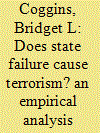

|
|
|
|
|
| Summary/Abstract |
A developed-world consensus ties state failure to new and serious international insecurity. But that conclusion rests upon an uncertain foundation; insights into the nature and intensity of failure-related threats remain tentative and unsystematic. This study begins to remedy the problem, examining the broad relationships between weakness, failure, and terrorism with panel data for 153 countries (1999–2008). I argue that the quantitative literature too often disregards the political context determining terrorism’s use, that terrorism is endogenous to many measures of state failure, and that estimates of the failure-related threat of terrorism are overstated. Consistent with these expectations, I find that most failing and failed states are not predisposed to terrorism. However, among the ‘‘most failed’’ states, those at war or experiencing political collapse are significantly more likely to experience and produce terror. These results refine the relationship between failure and external threat and highlight the importance of terrorism’s macro-level political context.
|
|
|
|
|
|
|
|
|
|
|
|
|
|
|
|
| 6 |
ID:
150481
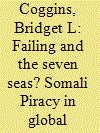

|
|
|
|
|
| Summary/Abstract |
This article reconciles the conflicting evidence on the relationship between governance and maritime piracy at the macro (state) and micro (sub-state) level using original data (2000–2011) and a study of piracy’s emergence in and around the Horn of Africa. It finds a consistent, positive relationship between state weakness and increased piracy production cross-nationally. However, Somali piracy belies the “anarchy as opportunity” mechanism implied by the large-N study. The pirate industry there received substantial support from local authorities, more consistent with a quadratic, “stability-enabled” argument regarding governance. I conclude that each is half-right. At the macro level, anarchy presents permissive conditions for simple banditry, but limits the potential for robust organized crime unless corruptible sub-state authorities exist and can be co-opted. Policy-wise, efficient pirate deterrence programs should concentrate on regions within failed states with this mix of characteristics. Methodologically, the results point to the limitations of existing metrics of state fragility and governance, and recommend that more nuanced measures be used.
|
|
|
|
|
|
|
|
|
|
|
|
|
|
|
|
| 7 |
ID:
113322
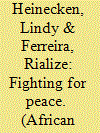

|
|
|
|
|
| Publication |
2012.
|
| Summary/Abstract |
This article reports on the experiences of South African military personnel who have been deployed on peace missions in Burundi, the DRC and Darfur/Sudan. These missions are extremely challenging for peacekeepers given the complex, vicious and protracted nature of the conflicts in these countries. This has placed heavy demands on individuals participating in field operations, not only because the operations are often dangerous and unpredictable, but also because of the conditions under which they have to serve and the resources available to them. In this study, the experiences of 94 SANDF personnel who have been deployed primarily in Burundi, the DRC and Sudan are analysed in relation to their operational experiences; the challenges posed by the rules of engagement; shortcomings in their training; and their readiness and interaction with other role players. The findings of this empirical research provide a real sense of how peacekeepers at the tactical level experience these deployments from a uniquely South African perspective.
|
|
|
|
|
|
|
|
|
|
|
|
|
|
|
|
| 8 |
ID:
140070
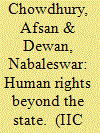

|
|
|
| 9 |
ID:
134103
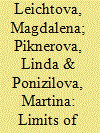

|
|
|
|
|
| Publication |
2012.
|
| Summary/Abstract |
The article presents a critical evaluation of the concepts of human development and weak statehood and outlines the relationship between them. It is argued that weak statehood has a very significant impact on the success of development strategies even if they stem from human development goals. For example, weak statehood has a direct effect on the provision or non-provision of public goods by the state. Therefore, connecting these concepts provides a perspective for analyzing various issues linked to implementation of development strategies. In conclusion, the article presents the concept of 'functional networking' as a tool for development in the anarchic environment of weak statehood. Functional networking is based on placing unmistakable emphasis on the development of individuals (daily livelihood of families), acceptance of Amartya Sen's condition of the freedom of individuals in terms of decision and opportunity, and the involvement of civil society.
|
|
|
|
|
|
|
|
|
|
|
|
|
|
|
|
| 10 |
ID:
098469
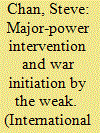

|
|
|
|
|
| Publication |
2010.
|
| Summary/Abstract |
Weak states often instigate war against the strong, sometimes repeatedly so. I explain this phenomenon by recourse to the nature of the contestants' foreign alignments. Pivotal patronage, balanced patronage, competitive patronage and one-sided patronage are offered as ideal types, and five rivalry cases are introduced to highlight the variations in the willingness and opportunity for war initiation by the weaker side and the intensity and duration of the subsequent conflict (should it occur). Whether the pertinent international system is unipolar, bipolar or multipolar distinguishes the alignment types, which in turn point to the concerns for relative gain and credible commitment that motivate the weaker side's decisions.
|
|
|
|
|
|
|
|
|
|
|
|
|
|
|
|
| 11 |
ID:
127123
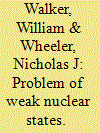

|
|
|
|
|
| Publication |
2013.
|
| Summary/Abstract |
Governments are increasingly recognizing the problem posed by internally weak nuclear-capable states. The problem, however, is under-theorized. This article brings together literature on sovereignty and international order, the nonproliferation regime, and weak states, and introduces new concepts to provide a more structured understanding of this problem. Insight comes from focusing attention on the function and governance of two nuclear estates (termed the production and operational estates), and on their resilience to decay and disorder occurring within the state and society. Drawing on empirical observation, the authors suggest a typology of weakness in nuclear states, involving state fragmentation typified by the former Soviet Union, the "hard weak state" typified by North Korea, and the internally conflicted state typified by Pakistan. Although these types give rise to distinctive difficulties, their alleviation depends heavily on the maintenance of internal authority within the state and estates, the presence or absence of cooperative relations, and the international regulatory framework's vitality.
|
|
|
|
|
|
|
|
|
|
|
|
|
|
|
|
| 12 |
ID:
135230
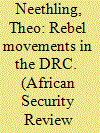

|
|
|
|
|
| Summary/Abstract |
Despite a generally valiant effort on the part of the United Nations (UN) since 1999 to bring peace and stability to the Democratic Republic of the Congo (DRC), the country continues to be destabilised by rebel forces. These armed movements pose a constant threat to the fragile transition in the DRC, and security in the country is continuously undermined. This article examines rebel forces in the DRC from two perspectives. Firstly, it examines such movements as a manifestation of sub-national terrorism. Secondly, it examines armed movements from the perspective of so-called ‘ungoverned spaces’. The view taken in this article supports the scholarly insight and argument that in countries such as the DRC, armed movements and militias are filling power vacuums that are the result of the inability and lack of military capacity of weak states to fight these movements effectively. Specifically, the eastern and north-eastern parts of the DRC have been major conflict zones where sub-national terrorists employ terror as a strategy. In this context, the DRC is severely affected by terrorism – a phenomenon in the DRC that is intimately linked to the failure to effect sustained development and to consolidate accountable and effective governance.
|
|
|
|
|
|
|
|
|
|
|
|
|
|
|
|
| 13 |
ID:
158283
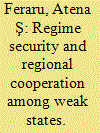

|
|
|
|
|
| Summary/Abstract |
This article focuses on a category of states, referred to as weak, proven to evade entrenched international relations theoretical assumptions relating to sovereignty and government interests. It renounces these premises and builds on the argument that state weakness generates a peculiar security predicament that shapes governments’ internal agenda. It focuses on Migdal’s (1988) findings of a regime security-centered mindset shared by weak states’ leaders and asks the following: does this common mindset generate a common approach to regional cooperation? It answers this question by inferring a set of strategies toward external cooperation and proceeds by testing their empirical validity in relation to three of the most integrated regional organizations in Southeast Asia, Africa, and the American continent.
|
|
|
|
|
|
|
|
|
|
|
|
|
|
|
|
| 14 |
ID:
171872
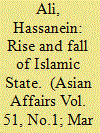

|
|
|
|
|
| Summary/Abstract |
The Islamic State (IS) is one of the most prominent transnational terrorist jihadist organizations. In 2013 and 2014, IS was able to control large swaths of Syria and Iraq, roughly the size of Britain, and announced the establishment of what it called the “Caliphate State”. The organization was defeated militarily through a long war on the Iraqi and Syrian fronts. Many local, regional and international parties participated in this war. In October 2019, IS's leader, Abu Bakr al-Baghdadi, was killed in a US raid at his safe house in the Syrian province of Idlib. This article will discuss the reasons of the rapid expansion of the IS, analyze the sources of its strength and assess the repercussions of its military defeat and death of its leader on its ability to survive, as well as foreseeing its future.
|
|
|
|
|
|
|
|
|
|
|
|
|
|
|
|
| 15 |
ID:
159885
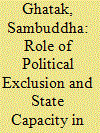

|
|
|
|
|
| Summary/Abstract |
Extant literature on intrastate conflict independently explores terrorism and civil war. However, both terrorism and civil war are probably parts of a continuum of intrastate conflict with the former at one end and the latter at the other end in terms of intensity. I argue that two factors play important roles in rebels’ decision-making calculus, namely, the size of their support base and state strength. Terrorism, as a strategy of the weak, is optimal when the rebel groups have little support among their audience and the state is strong. On the other hand, guerrilla warfare is an ideal strategy when such groups have a greater support base and the state is weak. The theoretical argument is tested on a dataset of Myanmar and six countries of South Asia and for 1970–2007.
|
|
|
|
|
|
|
|
|
|
|
|
|
|
|
|
| 16 |
ID:
111844
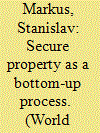

|
|
|
|
|
| Publication |
2012.
|
| Summary/Abstract |
How do property rights become secure? How does rule of law take hold in an economy? The author uses an original survey of 516 firms in Russia and Ukraine, as well as interview-based case studies, to reexamine these fundamental issues of political economy. Most states in the developing world lack the requisite time horizons and institutional capacity to make the credible commitments emphasized in the literature. In this context, the author argues that firms can enforce their property rights without resort to mafias by forming alliances with stakeholders such as foreign actors, community residents, and labor. These stakeholders can impose costs on the potential aggressors through diverse political strategies, allowing firms to defend their property rights not only from private predators but also from the state. The article evaluates this "bottom-up" theory of secure property rights against existing state-based theorizing.
|
|
|
|
|
|
|
|
|
|
|
|
|
|
|
|
| 17 |
ID:
160340
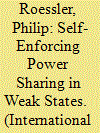

|
|
|
|
|
| Summary/Abstract |
Power sharing, in which elites from rival societal groups agree to share control of the central government, is a key source of domestic peace, enabling states to escape devastating cycles of exclusion and civil war. Yet the conditions giving rise to inclusive governance are not well understood. In contrast to existing scholarship that emphasizes the importance of external third-party mediation or strong formal institutions, we point to the structural roots of power sharing in which political inclusion stems from the distribution of societal power and the balance of threat capabilities it produces. Only when both the ruling group and a given rival group possess strong mobilizational capabilities, such that each could credibly threaten to recapture state power if excluded from the central government, does self-enforcing power sharing emerge. A strong rival induces the ruler to commit to power sharing and to reluctantly accept coup risk over civil war risk. The ruling group's own threat capabilities, in turn, constrain rivals from trying to convert their share of power into absolute power. Supported by extensive quantitative and qualitative evidence with particular reference to weak states in sub-Saharan Africa, we shed light on the conditions under which the distribution of violence within a state underwrites a peaceful and productive equilibrium. In doing so, we rethink how scholars approach the study of civil war. Rather than conceiving of it in terms of effective resistance, we model civil war as a contest for state power shaped by groups’ capabilities to project force in the capital.
|
|
|
|
|
|
|
|
|
|
|
|
|
|
|
|
| 18 |
ID:
186109
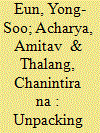

|
|
|
|
|
| Summary/Abstract |
This introductory article provides rationales and contextual background for the special issue which examines how weak states in Asia actualise and exercise their agency in the twenty-first century regional or global environments. The article opens with a consideration of why attention is drawn to the agency of the weak. Weak states are often treated as ‘objects’ of international politics rather than ‘subjects’, and their foreign policy actions are commonly taken to be ‘reflexive’ of external constraints, such as fluctuations in the balance of power in the international system. We disagree with this view. We argue that weak actors can demonstrate varieties of agency regardless of their position in the international system in terms of material capabilities. To clarify this point, the article reflects on the changed and changing global and regional environments and order. Rather than seeing them through the lens of great power politics and its signature concept of ‘polarity’, the article offers an alternative notion, namely a ‘multiplex’ world, and identifies the key nature of order therein: multiplicity and fluidity. Both material and normative power have already and continue to become fragmented, decentralised, and dispersed within and across states. While emphasising that such a multifaceted and fluid world opens up a wide avenue of agency for weak actors, this article also notes that the weak has varieties of agency as potentials.
|
|
|
|
|
|
|
|
|
|
|
|
|
|
|
|
| 19 |
ID:
105878
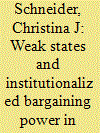

|
|
|
|
|
| Publication |
2011.
|
| Summary/Abstract |
A Stata replication package can be obtained from the author's Web page. I thank two anonymous reviewers, Josephine Andrews, David Armstrong, Scott Desposato, Mark Fey, Erik Gartzke, Hein Goemans, Peter Gourevitch, Katharina Holzinger, Mareike Kleine, Daniel Kono, Hartmut Lenz, Dirk Leuffen, Matthew Loveless, Zeev Maoz, Heather McKibben, Andy Moravcsik, Frank Schimmelfennig, Gilles Serra, Ben Shepherd, Branislav Slantchev, Randy Stevenson, Randy Stone, Dustin Tingley, Jennifer Tobin, Ingeborg Toemmel, Piero Tortola, Camber Warren, Matt Winters, and Langche Zeng for invaluable comments. I also received helpful comments from presentations at European Studies Association Conference (Los Angeles), Nuffield College (Oxford), Princeton University, University of California (Davis), University of Rochester, Rice University, University of California (San Diego), and University of Konstanz. This research project was supported by the Max Planck Society and the German Research Foundation. Ilka Ritter provided valuable research assistance. The usual disclaimer applies
|
|
|
|
|
|
|
|
|
|
|
|
|
|
|
|
| 20 |
ID:
107807
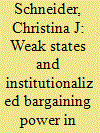

|
|
|
|
|
| Publication |
2011.
|
| Summary/Abstract |
When and how can weak states increase their bargaining leverage in international organizations? I argue that during phases of routine bargaining, distributional outcomes depend on the states' political and economic leverage and less on the formal allocation rules, so they are unfavorable to weak states. This changes in phases of extraordinary bargaining, which are occasioned by significant reform such as enlargement. States that expect distributional conflict from enlargement can threaten to block accession negotiations and increase their membership benefits even if they are politically weak. Statistical and qualitative analyses of distributional bargaining in the European Union support the theoretical claims.
|
|
|
|
|
|
|
|
|
|
|
|
|
|
|
|
|
|
|
|
|